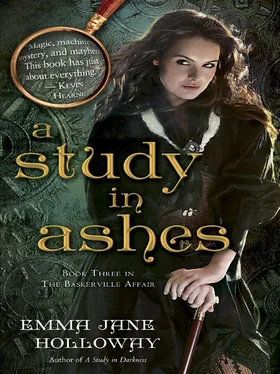But now that he’d made the connection, what did it mean? Had the note from Duquesne’s come from someone connected to the merchant company? He picked up the letter, reading it over again. It was still the same bland apology as before, so he turned his attention to the letterhead itself—and the two fierce dragons descending to the underworld, smoke pouring from their nostrils. He’d thought them picturesque but irrelevant before, and yet now he began to wonder. Han, the Chinese foreman, had commanded some sort of magical serpent guardian.
Spurred by a fresh idea, Bancroft returned to the file and kept flipping pages until he found a second paper. It had been a list of companies in the Limehouse area that he might want to contact. He’d got it from the tax rolls. These were the official company names gathered by the local authorities, and they sometimes differed from what the traders put on their signs. Bancroft found the listing with the same address as his dragon letterhead. It was for the Mercantile Fellowship of the Black Dragons of the Hidden Sea. There were two contacts listed, and with a ping of surprise, he recognized one of the names. It wasn’t the signatory of the letter, but instead a Mr. Fish.
Bancroft sat back in his chair. Mr. Fish? He knew the name from the minutes the Steam Council published in the Bugle . He knew the minutes were just official drivel meant to project the image of public-spirited men of business—and probably reporting about 5 percent of what actually occurred—but the list of attendees was probably correct. The oddity of the name—who called himself Fish?—had made it stick in his mind though he had only seen it on two occasions, for the Black Kingdom sent a different representative to the council almost every time.
That raised brand-new questions. Did the Mercantile Fellowship of the Black Dragons of the Hidden Sea have a connection with the Black Kingdom underneath London? Since the Chinese were supposed to be unaligned with any member of the Steam Council, that gave Bancroft pause. Had he stumbled across a little-known alliance?
But worse was the possibility that he’d drawn the attention of the underground world. Nobody knew much about it, and those who did were too afraid to speak of what they knew. Black ruled more than the utility infrastructure that passed beneath the streets—and the other barons had paid dearly for permission to install most of that anyhow. Silence Gasworks, the company that provided Black’s steam and gas, produced just enough for the underground’s use. No, Black’s true power lay elsewhere, ruled over by a presence—no one knew precisely who or what—that seemed to be far older than the Steam Council.
There were certainly places the daylight traveler could go beneath the earth—the carefully negotiated territories of the underground rail lines, for instance—but it was folly to step outside those carefully demarcated boundaries. Few who strayed into the labyrinth of Black’s subterranean passages ever came back.
Bancroft’s fingers twitched, then started to shake.
So what did the Black Kingdom want with him?
Dartmoor, October 4, 1889
BASKERVILLE HALL
3:15 p.m. Friday
BASKERVILLE HALL WAS ONE OF THOSE NIGHTMARE PROPERTIES that argued for a box of matches and a barrel or two of oil. Watson had first thought so upon arrival and now, standing outside and staring up at the grim edifice, he was ready to assist the would-be arsonist. The beds alone were a felony.
The hall had probably been the last word when it was built—Watson guessed the original parts of the house dated to Good Queen Bess or maybe even her father. But nothing in it had been updated since. The furniture and finishes were oily black with age. The house itself was square and dark, made gloomier still by the fact that someone had bricked over many of the windows, probably during an era when windows were taxed. The only people who could have been happy there were Gothic novelists, maniacs—more or less the same thing—or perhaps moles.
And when one tried to escape the dank chill of the house, the main attraction was a path—about twenty feet across, counting the lawn—flanked by impenetrable twelve-foot yew hedges. And, to complete the effect, the only way in or out of the walk was a wicket gate that led onto the bleak, wandering vastness of the moor. And there, amid the rolling sea of wild gorse and prehistoric ruins, were bogs waiting to suck down unsuspecting ramblers and the occasional pony.
It was at that place, near the moor gate, where Sir Charles had died. The man had been found face down, his arms splayed and clutching the ground, and his face contorted with fear. There had been no physical injuries to speak of, beyond heart failure. The consensus at the hall was that the old gentleman had been frightened to death. Maybe he’d finally noticed where he’d been living.
Holmes, who had been peering at the ground where the body had been discovered, came up beside Watson. “I found nothing but the footprints of a dog.”
“Well, you were looking for a legendary agent of death. Besides the mildew in my bedding, that is. Perhaps it was the ghostly Hound of the Baskervilles enacting an ancient curse.”
Holmes looked amused, but it was fleeting. “Very good. See what you can do with that in your literary exploits. I’ve convinced the Gold King that Evelina’s presence is mandatory to the investigation, but we have yet to give substance to the tale. Make it convincing.”
Watson was getting just a little testy. He had set out to chronicle Holmes’s cases, not spin tall tales. “One thing I wish to question from the start. Speaking as a medical man, I don’t understand how heart failure translates to murder.”
Holmes grew serious. “Sir Charles clearly died of terror. Perhaps not a usual weapon, but effective nonetheless.”
Watson considered that. “Despite the man’s appearance at the moment of death, how can we prove such a thing? What kind of clues, much less evidence, can we hope to find to convict this bogeyman?”
Holmes hunched slightly, as if to fend off the question. “We shall work the same as we always do, my good doctor. No detail will escape our notice.”
Watson was doubtful. “And Evelina?”
“The Gold King is sending Tobias Roth with her, which may prove a nuisance.”
“He shot you not so long ago.”
“Thank you for reminding me.” Holmes gave a short laugh. “Perhaps you should be the one to keep him distracted. I propose that we—by which I mean you—find a means of sedating the young man, relieve him of the key to her manacles, and get her to safety. Once she is gone, it will be no great matter to lead him off in a false direction as he searches to recapture her. He must leave before the rest of the Baskerville council arrives. And just to complicate matters, Miss Barnes and her friends are installed in the town, waiting for Evelina to join them. They are devoted to the Baskerville cause, and yet not all of the council are friendly to magic users. We have done what we can to ensure the two groups do not mix, for the last thing we need now is a spat between our allies.”
“That’s a lot of stage management,” Watson said uneasily. “A lot of players to keep out of each other’s way.”
Holmes made a face. “Very true. And it would be bad enough if Evelina had come with an ordinary Yellowback, but Roth will make this harder. He is smart, and anything he sees will find its way back to the Gold King.”
“Is it worth the risk to attempt this all at the same time?”
“When else would we have these circumstances? If we can free my niece, then take down the laboratories, we shall have struck two blows against the Gold King. With some victories behind us, swaying others to the Baskerville cause will be easier.”
Читать дальше








